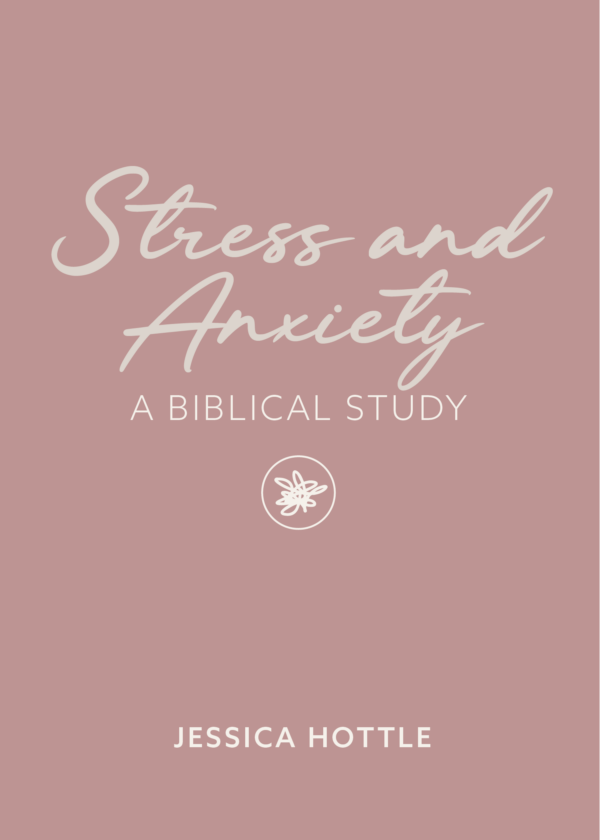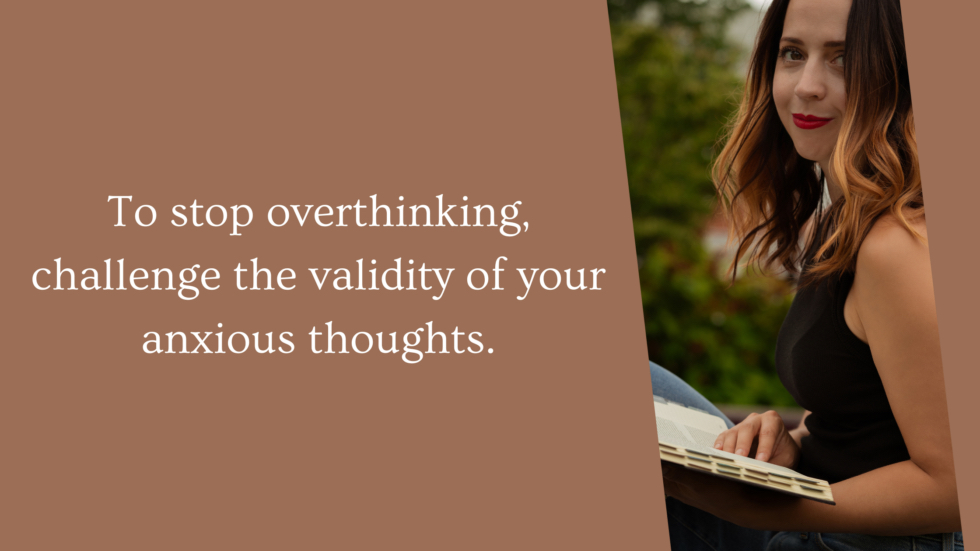Have you ever made a decision and then immediately felt regret? When we are learning how to stop overthinking, it’s important we get into the practice of questioning our thoughts. Decisions come with change. To stop overthinking, we must make a decision to interrupt the current thought pattern.
I’ve also learned the decisions we make often produce a change of some kind. And the thing about change is that it can bring about loss. (Which is why we often overthink. We think of every scenario we can to prevent something from happening.)
The thing we lose will often be the thing we grieve over. What it once was, what you wish it could have been, and what it may never be.
To grieve is to be sad, cry, ache, or suffer. To grieve is to feel loss of any kind.
Sometimes, it’s the distance you feel from the family that you wish could look different.
Sometimes, it’s walking away from friends who are not going in the same direction as you.
I can understand how hard it may feel to make a decision only to feel like you made the wrong one because of all the feelings or changes that one decision brings.
But sadness after a choice doesn’t mean it’s the wrong one.
Psalm 94:19 says, “When my anxious thoughts multiply within me, Your consolations delight my soul.” Many of the psalms were written by overthinkers who were facing danger, emotional unrest, fear, or despair. They boldly wrote out their anxious thoughts and then turned them into the worship of God.
Maybe that’s what you needed to hear today. That you are not alone and that even if you feel sadness after a decision, it doesn’t mean it’s the wrong one.
By the way, what if I told you your feelings aren’t inherently bad or sinful? You don’t need to fear or suppress them. They can be a guide. If you’re interested, I have a free 3-day study on living by faith while processing emotions. Check it out here!
Spiritual Practices to Stop Overthinking
I think we all love practical ways for us to stop overthinking. I am going to cover spiritual practices, emotional techniques, and physical strategies to get your whole body involved in this process.
Below you will find helpful ways to stop overthinking with spiritual practices.
Prayer: To stop overthinking, take a moment to communicate with God. Let Him know about your anxieties and ask for clarity and peace. Remember, Philippians 4:6-7 says, “Do not be anxious about anything, but in every situation, by prayer and petition, with thanksgiving, present your requests to God. And the peace of God, which transcends all understanding, will guard your hearts and your minds in Christ Jesus.”
Meditate on Scripture: Scriptures can provide solace and a way to stop overthinking. When overwhelmed with thoughts, focus on verses like Matthew 6:34, “Therefore do not worry about tomorrow, for tomorrow will worry about itself. Each day has enough trouble of its own.”
Practice Mindfulness with God: Being present in the moment can help you stop overthinking. As you breathe deeply or focus on your surroundings, do so with an awareness of God’s enveloping presence.
Journaling: Writing down your anxieties and thoughts can be a helpful tool to stop overthinking. Sometimes, the act of writing releases pent-up emotions. At the end of your writing session, offer your concerns in a prayer, entrusting them to God.
Christian Community: Engage in fellowship. Surrounding yourself with believers can help reassure you and provide techniques to stop overthinking. They can pray with you, support you, and offer biblical wisdom.
Seek Professional Counseling: If you’re struggling to stop overthinking and it’s affecting your well-being, it might be useful to see a counselor or therapist who can incorporate faith-based strategies into their guidance.
Don’t try to do these all at once. Determine what season of life you are in and what you need the most right now. Pick one to begin to practice with. The ways of Jesus are not about something we check off of our to-do list but spiritual disciplines we put into practice as we follow Him.
Biblical Study on Stress and Anxiety eBook
$5 Are you stuck in a cycle of stress and anxiety, wondering if there’s a way to break free and find peace that lasts? Embark on a transformative journey from feeling anxious and stressed to living with peace and freedom. This biblical study offers an insightful exploration of stress and anxiety, providing practical tools to…
Emotional Techniques to Help You Stop Overthinking
I think one of the reasons we overthink is because we are afraid to make the wrong decision; therefore, we don’t make one at all.
Below are a few techniques to help you begin to make a decision by setting up boundaries and time limits.
Awareness: Recognize and acknowledge when you’re caught in the loop of overthinking. Sometimes, merely saying to yourself, “I need to stop overthinking this,” can be the first step in redirecting your thoughts.
Question Your Thoughts: To stop overthinking, challenge the validity of your anxious thoughts. Ask yourself:
- “What’s the evidence for and against this thought?”
- “Is this a productive line of thinking?”
- “What’s the worst that could happen, and how would I cope?”
Set Time Limits: Assign yourself a set duration to contemplate an issue. Once that time concludes, purposefully redirect your thoughts to stop overthinking.
Limit Information Intake: If you’re overthinking a specific subject, minimizing exposure to related information, especially if negative, can curb the cycle.
Set Boundaries: When certain subjects or dialogues intensify overthinking, it’s constructive to set conversational boundaries.
Break Tasks into Steps: When tasks or choices amplify overthinking, deconstruct them into smaller, digestible segments, making them less daunting.
Try different techniques to see which one will help you the most.
Physical Strategies to Try to Stop Overthinking
Deep Breathing: Taking deep, controlled breaths can help calm the nervous system. This technique can be a go-to whenever you need to stop overthinking. Inhale for a count of four, hold for four, then exhale for four, focusing on the present moment.
Exercise: Physical activity can be an effective way to stop overthinking. Whether it’s a brisk walk, yoga, or any other form, exercise releases endorphins, which act as mood elevators and natural painkillers.
Grounding Techniques: 5-4-3-2-1: When you need to stop overthinking, focus on your surroundings. Identify five things you can see, four you can touch, three you can hear, two you can smell, and one you can taste. Hold onto an object: Carrying something like a small stone or token in your pocket can serve as a tactile reminder to stop overthinking.
Limit Stimulants: To reduce the tendency to overthink, consider minimizing caffeine and sugar intake, as they can magnify anxiety.
Change Your Environment: A simple change of scenery can help you stop overthinking. If you’re indoors, step outside to reset your mind.
Tactile Activities: Immersing yourself in activities like knitting or playing with stress-relief toys can be therapeutic and help distract from overthinking.
Cold Water: A splash of cold water on your face can jolt your system, providing an immediate break from overthinking.
From a neurological perspective, overthinking can be linked to activity in the prefrontal cortex, a part of the brain responsible for decision-making, planning, and personality development. Overactivity or certain patterns of activity in this region may be associated with rumination. The amygdala, which is central to our emotional responses, might also become overactive, signaling a potential threat and therefore causing anxiety or stress.
It’s important to note that everyone overthinks from time to time, but when it becomes a chronic issue and interferes with daily life and well-being, it will be beneficial to apply these strategies or find support to manage it.
Overthinking can be traced back to how different parts of our brain work. The front part of our brain, called the prefrontal cortex, helps us make decisions. If it’s too active, we might think too much about choices. Another part, the amygdala, handles our emotions. If it’s overly active, we might feel anxious and keep thinking about the same worries. There’s also a network in our brain that’s active when we daydream, and if it’s working too much, it can make us overthink.
Lastly, how different parts of our brain talk to each other can affect our thinking patterns. Outside factors, like our environment or personal traits, can add to these brain-based reasons. Techniques like meditation can help calm these brain activities and stop overthinking.
Resources to Stop Overthinking
- Work with me one-on-one.
- Shop biblical studies.
- Get my program Untangle Your Thoughts.
- Read Get Out Of Your Head.
*Some of these links are affiliate links. This means I receive a small commission when you one of these links, which goes back to my ministry.







Hello Jessica. I am going through an anxious time and worrying that it means my faith and trust in God are not as they should be. Your advice has helped tremendously. I shall put your suggestions into practice, a few at a time, and working towards consciously embracing those which work best for me. Thank you for caring.
Thank you for reading! I am grateful it encouraged you!
I struggle with this a lot I always overthink things way too much. I’m going to take your advice and try them. I learned that my faith in God is not where it should be.
Blessings
I’m here if you have any questions.
Is there hope for a 83 year old woman? Any different suggestiions?
There is always hope – especially with Christ. It’s a willingness on our end.
I overthink everything ,if things are not going good with my son and his wife I worry and start over thinking the wrost they they have had a lot from addiction, to jail,almost lost my son twice to addiction he’s been clean for awhile don’t feel that a problem but they still have so many relationship problems I worry about what that could cause to happen I can’t seem to get over what could happen then I worry and over think of what’s happening until it makes me sick I feel it because of all the stuff that has happened.
Praying for you! Don’t try to do it alone!